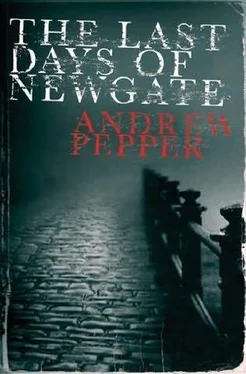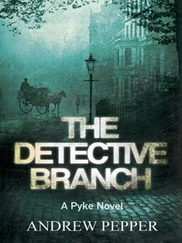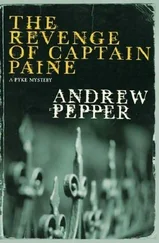Andrew Pepper - The Last Days of Newgate
Здесь есть возможность читать онлайн «Andrew Pepper - The Last Days of Newgate» весь текст электронной книги совершенно бесплатно (целиком полную версию без сокращений). В некоторых случаях можно слушать аудио, скачать через торрент в формате fb2 и присутствует краткое содержание. Жанр: Исторический детектив, на английском языке. Описание произведения, (предисловие) а так же отзывы посетителей доступны на портале библиотеки ЛибКат.
- Название:The Last Days of Newgate
- Автор:
- Жанр:
- Год:неизвестен
- ISBN:нет данных
- Рейтинг книги:4 / 5. Голосов: 1
-
Избранное:Добавить в избранное
- Отзывы:
-
Ваша оценка:
- 80
- 1
- 2
- 3
- 4
- 5
The Last Days of Newgate: краткое содержание, описание и аннотация
Предлагаем к чтению аннотацию, описание, краткое содержание или предисловие (зависит от того, что написал сам автор книги «The Last Days of Newgate»). Если вы не нашли необходимую информацию о книге — напишите в комментариях, мы постараемся отыскать её.
The Last Days of Newgate — читать онлайн бесплатно полную книгу (весь текст) целиком
Ниже представлен текст книги, разбитый по страницам. Система сохранения места последней прочитанной страницы, позволяет с удобством читать онлайн бесплатно книгу «The Last Days of Newgate», без необходимости каждый раз заново искать на чём Вы остановились. Поставьте закладку, и сможете в любой момент перейти на страницу, на которой закончили чтение.
Интервал:
Закладка:
‘What a pity. I do so like a man who’s concerned about his figure.’ Godfrey patted his own girth but his expression became serious. ‘They’re an abominable lot, the Ultras. Edmonton, Eldon, Newcastle, Cumberland. All of ’em would shit in their own food and eat it if it would hold up reform,’ Godfrey said, working his way around the various ale pots, looking for dregs.
Still drunk, Foote heaved his head off the table and stared at Pyke, confused. Saliva hung from his mouth. ‘That’s right, an abomination. We’re an abomination to them, you know. A veritable abomination. Mark my words, times are changing, boy. We’ll be for the rope. Our faces don’t fit. They won’t tolerate us for much longer. The whole thing’s a disgrace.’ Foote looked up at him, expectant of an answer, but since Pyke didn’t know what was a disgrace and who ‘we’ or ‘they’ referred to, he said nothing.
But Godfrey nodded solemnly in agreement. ‘We’re a dying breed, that’s for certain. A dying breed.’ He reached for an empty ale pot. ‘Hail to the new captains of industry, the bureaucrats, the politicians. The future is yours.’
It saddened Pyke to see Godfrey so old and out of sorts. As someone who had witnessed his uncle hold his own against Godwin, discussing the relative merits of polite anarchy, or Paine, arguing about the evils of organised religion, Pyke felt angrier than he had expected that Arthur Foote now constituted his uncle’s preferred drinking companion. As he left, Pyke kicked the chair away from under Foote’s hulking frame and watched him tumble on to the floor.
From the position Pyke had taken up in Batson’s, the coffee house across the road from William Blackwood’s Cornhill office, there was plenty of time, over the following two days, to assess his subject. Swift, if that was the man’s name (for Pyke took nothing Edmonton told him at face value), was punctual, arriving at the office on the dot of nine and leaving at five. He appeared to live an orderly life. On both days, Swift took the same route from work to his moderate apartment on Finsbury Square, and on both occasions it had taken him exactly twelve and a half minutes, walking at a brisk pace.
Swift was moderately built, with sandy hair and bushy eyebrows. He had a large brown mole on his chin. If Pyke had to make a snap judgement, he would say that he didn’t care for the man. Like many ex-military sorts, Swift had a mincing, almost arrogant gait that suggested that the folk who traversed the pavements in his immediate vicinity were necessarily of a lower order.
On the third afternoon Pyke had taken up his usual position in the window of the coffee house when he spotted a carriage rattle past him carrying Emily Blackwood and a female companion. On impulse, he picked up his coat and set off after the carriage, which had slowed to allow a procession of sheep and their drover to pass by, heading north to Smithfield market. It took him a few moments to catch his breath, and while he did so, Pyke peered into the well-appointed interior of the carriage.
Emily did not seem to recognise Pyke or did so only reluctantly, once he had made his introductions. He made an inconsequential remark about the cold weather.
Her companion, Jane Norman, was introduced as a member of Emily’s committee of female prison visitors. She couldn’t contain her excitement. ‘But has Miss Blackwood told you our wonderful news? It seems an anonymous benefactor has bequeathed a not insignificant sum of money to us and we will be moving to more respectable offices on the Strand, no less, within the month.’ As she spoke, she pulled her shawl tighter around her shoulders.
Pyke said it was good news and, with a broad grin, added he’d always felt it was easier to spend other people’s money on frivolities than his own.
This drew an amused look from Emily. ‘Mr Pyke is, indeed, a dour, puritanical soul who does not believe in frivolities of any kind.’ She was wearing a heavy overcoat, a printed wool dress and a matching wide-brimmed bonnet. She wore no gloves and her slim fingers had turned blue in the icy temperature.
Mrs Norman screwed up her face. ‘Really? What does he do for amusement?’
Emily turned to face him. ‘What do you do for amusement, Mr Pyke?’ she asked, her eyebrows arched.
‘You mean when I’m not robbing from the undeserving rich?’
That seemed to upset Mrs Norman but Emily just laughed. ‘And oppressing or locking up the deserving poor?’
Mrs Norman asked, ‘Is this man really a thief?’
‘He’s a Bow Street Runner,’ Emily explained, looking at Pyke. ‘I’m told it’s the next best thing.’
‘Except when you come face to face with a real villain and you holler for someone to keep you safe.’ He held her stare and whispered, so that her companion could not hear, ‘Tuck you up in bed.’
She proffered a throaty laugh. ‘Somehow I can’t see you as my nursemaid.’
‘You don’t think the outfit would suit me?’ he whispered, again so Mrs Norman couldn’t hear.
Emily seemed to be enjoying herself. ‘I’m not sure you’d have the stamina for it.’ She lowered her voice to a whisper. ‘Or the figure.’
‘And if I told you I shaved liberally. .’
The procession of sheep had passed by and Emily’s carriage was now blocking traffic behind them. Pyke smiled, said he hoped their work continued to save souls and dug his hands into his pockets.
As the carriage pulled off, he looked back along Cornhill and saw Swift emerge from the bank’s office and hurry down the crowded street in the direction of Wren’s great cathedral.
Swift pursued his usual path to the bottom of Cornhill, but instead of rounding the Bank of England and turning northwards for home, he continued across the road until it turned into Cheapside. The dominating presence of St Paul’s loomed. Pyke followed him at a discreet distance and was actively intrigued by Swift’s urgency and the apparent change in his manner. On other occasions, Swift had seemed utterly at ease, taking no notice of his surroundings, but this time he was much less certain of himself and constantly looked behind him. Even his irritating gait was notable by its absence.
After the cathedral, they headed down Ludgate Hill, where the street became narrower and the surroundings less salubrious. The buildings were shabbier and the road filled with potholes and horse dung. On Cornhill, most of the premises had been banks, offices and coffee houses. Here they were taverns, pawnshops and tobacconists, and the cobbled streets they spilled out on to were choked with people of every class and hue. Pushing his way through a throng of unfamiliar faces, Pyke struggled to keep his prey in view and willed himself to shut out the unmelodious din of iron-clad hoofs clattering against the stone cobbles and market traders pushing their barrows loaded with stale vegetables.
On the far side of the street, Pyke was suddenly distracted by four boys closing in on a well-dressed man. Two stalked him from behind, two from the side. One of the boys from behind tipped the man’s hat and, as his hands left his pocket to catch it, Pyke saw his watch being removed and his vest pocket being emptied by the boy next to him. Only when the boys had parted ways and disappeared into the adjacent back alleys did the man realise what had happened, by which time it was too late. No one came to his rescue when he cried for help.
On Fleet Street there was a noisy procession involving a ragtag bunch of poorly dressed whiskered men; some were banging tins, others shouted anti-papist abuse. They were heading for Hyde Park, where one of Daniel O’Connell’s supporters was organising a rally in favour of Catholic emancipation. Pyke knew this because all the Bow Street foot patrols had been summoned by Sir Richard Fox to police the situation and keep the two warring sides apart. They had been told to act as peacemakers, but Pyke knew as well as anyone else that, should there be trouble, many of the assembled Runners would join forces with the Protestant mob and turn on the papist rabble-rousers. Pyke had no special affinity with the Protestant religion, which he saw as joyless and disciplinary. But he would not lose sleep over the spilling of Catholic blood. In the end, Catholics and Protestants could kill themselves and others to earn glory from a God who didn’t care about them, but Pyke would not be fooled into such pointless sacrifice.
Читать дальшеИнтервал:
Закладка:
Похожие книги на «The Last Days of Newgate»
Представляем Вашему вниманию похожие книги на «The Last Days of Newgate» списком для выбора. Мы отобрали схожую по названию и смыслу литературу в надежде предоставить читателям больше вариантов отыскать новые, интересные, ещё непрочитанные произведения.
Обсуждение, отзывы о книге «The Last Days of Newgate» и просто собственные мнения читателей. Оставьте ваши комментарии, напишите, что Вы думаете о произведении, его смысле или главных героях. Укажите что конкретно понравилось, а что нет, и почему Вы так считаете.












